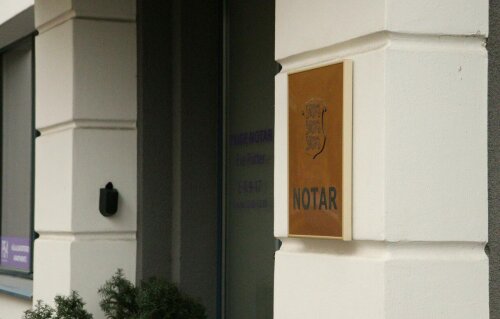Best Inheritance Law Lawyers in Estonia
Share your needs with us, get contacted by law firms.
Free. Takes 2 min.
Or refine your search by selecting a city:
List of the best lawyers in Estonia
1. About Inheritance Law in Estonia
Estonia regulates how a person’s estate is handled after death through the Inheritance Act (Pärimise seadus) and related civil law. The system covers both testamentary dispositions and intestate succession when someone dies without a will. It also governs the rights and duties of heirs, as well as the procedures for transferring assets, paying debts, and resolving disputes.
Key ideas include the distinction between a will and intestate succession, the role of heirs such as a surviving spouse and children, and the involvement of notaries or courts to administer the estate. In addition, civil code provisions regulate property transfers, debts, and the formalities needed to validate wills or confirm heirs. Understanding these rules helps individuals plan ahead and respond effectively after a family member’s death.
For residents of Estonia, practical steps often involve confirming whether a will exists, identifying rightful heirs, and navigating any required probate or estate administration. Working with a lawyer who specializes in inheritance matters can make these steps clearer and help prevent or resolve disputes.
Authoritative note: Inheritance law in Estonia rests on the Inheritance Act (Pärimise seadus) and the Civil Code, with notarial support commonly used to formalize wills and estate administration. See official sources for the statutory framework.
2. Why You May Need a Lawyer
Below are concrete scenarios where seeking an inheritance law specialist's advice is helpful. Each example reflects real-world situations that commonly arise in Estonia.
- A survivor questions who is entitled to the estate after a relative dies without a valid will, triggering intestate succession and possible disputes among siblings or extended family.
- You received a will that appears contradictory or unclear about shares, and you need help interpreting the testament and asserting your rightful share.
- A family member challenges a will or an inheritance decision, and you need representation to protect your interests in negotiations or court proceedings.
- You must manage estate assets located in different places, including properties in Estonia and assets abroad, requiring coordination of cross-border legal steps and taxation considerations.
- Your estate includes complex assets such as businesses, shares, or real property, and you need guidance on valuation, succession planning, and debt settlement.
- You are dealing with the registration and transfer of real property in an inheritance, where correct certification and notarial acts are essential to avoid title issues later.
3. Local Laws Overview
The Estonian framework centers on two main sources: the Inheritance Act (Pärimise seadus) and the Civil Code (Tsiviilseadustik). These laws determine who inherits, how shares are allocated, and what procedures are required to settle an estate. They also cover the validity and execution of wills and the role of notaries in estate administration.
In addition to these statutes, practical administration of an estate often involves notarial and court processes. Notaries typically oversee the preparation and certification of wills, while courts may become involved to resolve disputes or confirm heirs when necessary. The following points highlight jurisdiction-specific concepts you may encounter in Estonia:
- Pärimise seadus addresses both testamentary distributions and intestate succession when there is no will.
- Civil Code sections on succession govern how property and debts transfer from the deceased to heirs after probate or judicial confirmation.
- Notarial practice is commonly used to formalize wills and certify estate-related documents, ensuring lawful transfer of assets.
Recent or notable considerations: Estonian inheritance practice has evolved with administrative updates to probate procedures and the use of formal notarial acts to streamline estate settlements. When dealing with cross-border assets or complex holdings, collaboration with tax professionals and legal counsel is advisable to address potential tax implications and international coordination.
Useful legal references: - Riigi Teataja (official publication of Acts and amendments) serves as the primary source for the text and changes to the Pärimise seadus and Civil Code. See https://www.riigiteataja.ee/ - Ministry of Justice in Estonia provides guidance on wills, notaries, and related procedures at https://www.just.ee
For further context, official Estonian sources outline the statutory framework and practical steps for inheritance matters, including the roles of heirs and the notarial process.
4. Frequently Asked Questions
What is the Inheritance Act in Estonia?
The Inheritance Act (Pärimise seadus) governs how estates are distributed when someone dies, including wills and intestate succession. It also outlines procedures for proving heirs and transferring property.
How do I start probate for an Estonian estate?
Begin by identifying assets, debts, and heirs. A lawyer or notary can guide you through notifying authorities, collecting documents, and filing required forms with the competent court or notary, depending on the case.
What is a notarial will and is it required?
A notarial will is a will drafted and certified by a notary. It is commonly used in Estonia because it provides clear legal proof of the decedent's intentions and eases probate.
When should I contest a will or an inheritance decision?
Contest a will if you believe it is invalid, was made under fraud or undue influence, or if you have a legal right to a reserved share that was overlooked. Time limits apply and vary by case.
Where can I find the official law texts for inheritance matters?
Official law texts are published in the Riigi Teataja, Estonia's government gazette. They provide current and historical versions of the Pärimise seadus and related acts.
Why might I need to involve a tax adviser in an inheritance matter?
Estates can have tax consequences for beneficiaries and property transfers. A tax adviser helps identify obligations, exemptions, and reporting requirements.
Can a will be made electronically or remotely in Estonia?
Estonian practice generally favors formal notarial acts for wills, including steps that may involve electronic components. A lawyer can confirm current permissible formats and requirements.
Should I hire a lawyer or a notary for estate matters?
Notaries handle many formal steps in will creation and estate settlement. Lawyers provide broader advocacy, dispute resolution, and complex interpretation of the law.
Do I need to prove who I am and my relationship to the deceased?
Yes. Heirship and rights to an estate require documentation proving identity and relationship, such as birth certificates, marriage certificates, and death certificates.
Is there a timeframe for completing probate or estate settlement?
Timeframes vary by case complexity, assets, and disputes. Simple estates with clear wills can settle within a few months; contested cases may take longer.
What is the difference between an heir and a beneficiary?
Heirs are those entitled to inherit under the law if there is no will. Beneficiaries are named in a will or other instrument to receive assets.
Do cross-border assets affect how inheritances are processed?
Yes. Cross-border assets require coordination of Estonian law with any applicable foreign law and may involve international tax considerations and filings.
5. Additional Resources
- Riigi Teataja - Official source for the text of Estonian laws, including the Inheritance Act and Civil Code. https://www.riigiteataja.ee/
- Ministry of Justice - Government guidance on wills, notaries, and probate procedures within Estonia. https://www.just.ee
- Tax and Customs Board (Maksu- ja Tolliamet, EMTA) - Information on tax implications related to inheritances and asset transfers. https://www.emta.ee
These sources are official Estonian government resources that provide legal texts, procedural guidance, and tax considerations relevant to inheritance matters.
6. Next Steps
- Define your needs - Decide whether you need help interpreting a will, contesting an estate, or administrating assets. This clarifies the type of lawyer to hire. (1-2 days)
- Gather key documents - Assemble death certificates, wills, property deeds, debt statements, and family records. Having organized files speeds up the process. (1 week)
- Identify commonly used specialists - Look for lawyers or solicitors with explicit inheritance law experience and a track record in Estonian probate matters. (2-3 weeks)
- Check credentials and client reviews - Verify registration as an Advokaat (lawyer) and review past estate cases, including disputes resolved. (1-2 weeks)
- Request initial consultations - Contact 2-4 practitioners to discuss your case, costs, and timelines. Prepare questions about process and likely outcomes. (2-4 weeks)
- Obtain a written engagement plan - Ask for a clear scope of work, fee structure, and estimated timeline before proceeding. (3-7 days)
- Agree on a timeline and milestones - Establish probate steps, document submission deadlines, and anticipated court or notary actions. (Ongoing)
Lawzana helps you find the best lawyers and law firms in Estonia through a curated and pre-screened list of qualified legal professionals. Our platform offers rankings and detailed profiles of attorneys and law firms, allowing you to compare based on practice areas, including Inheritance Law, experience, and client feedback.
Each profile includes a description of the firm's areas of practice, client reviews, team members and partners, year of establishment, spoken languages, office locations, contact information, social media presence, and any published articles or resources. Most firms on our platform speak English and are experienced in both local and international legal matters.
Get a quote from top-rated law firms in Estonia — quickly, securely, and without unnecessary hassle.
Disclaimer:
The information provided on this page is for general informational purposes only and does not constitute legal advice. While we strive to ensure the accuracy and relevance of the content, legal information may change over time, and interpretations of the law can vary. You should always consult with a qualified legal professional for advice specific to your situation.
We disclaim all liability for actions taken or not taken based on the content of this page. If you believe any information is incorrect or outdated, please contact us, and we will review and update it where appropriate.
Browse inheritance law law firms by city in Estonia
Refine your search by selecting a city.
















